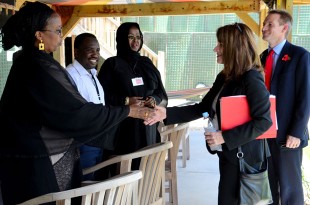By Lynne Featherstone, MP
Minister for International Development
When you think of Somalia, you probably think of Black Hawk Down, Al Shabaab terrorism and piracy. But if you’re born a girl in Somalia, you face so many other risks, both severe and everyday.

Decades of war and humanitarian crises have given Somalia a reputation as one of the worst places to be woman or a child in the world. Girls and women suffer disproportionately from violence and instability. One in 16 women will die during childbirth, and 1 in 10 will die during her reproductive years. Whilst data is scarce, it is thought that 98% of Somali women have undergone female genital mutilation (FGM).
Last week I became the first DFID minister to spend a night in Mogadishu, the capital of Somalia. I was there in my capacity as the UK’s ministerial champion for tackling violence against women and girls overseas, as part of a fact-finding and awareness-raising tour to break the silence on an issue that can no longer be taboo. So far my tour has taken me to the United Arab Emirates to tackle the issue of gender-based violence in refugee camps, and I am now in Bangladesh, where two-thirds of girls are married before their eighteenth birthday. All countries suffer from violence against women and girls. We’re all located on a spectrum of violence, and we must help and learn from each other to end it.
Back to Somalia. There is a nascent movement in Somalia to end FGM, and the Federal Government of Somalia as well as the governments of Somaliland and Puntland, committed to eliminate the practice at the Girl Summit the coalition government hosted in London in July. But new research suggests that while there is widespread support in Somalia for ending the most extreme and medically egregious form of FGM, known as ‘pharaonic’ ‘type III’ or infibulation, the majority of Somalis still supports ‘sunna’, which can involve anything from a small nick to the full removal of the clitoris, removal of flesh, or stitching. People are also now going to medical facilities to undergo FGM, with the help of health professionals, in the belief it is more hygienic. So we’ve got a long way to go.
Read more: Breaking the silence
Source:lynnefeatherstone.org


